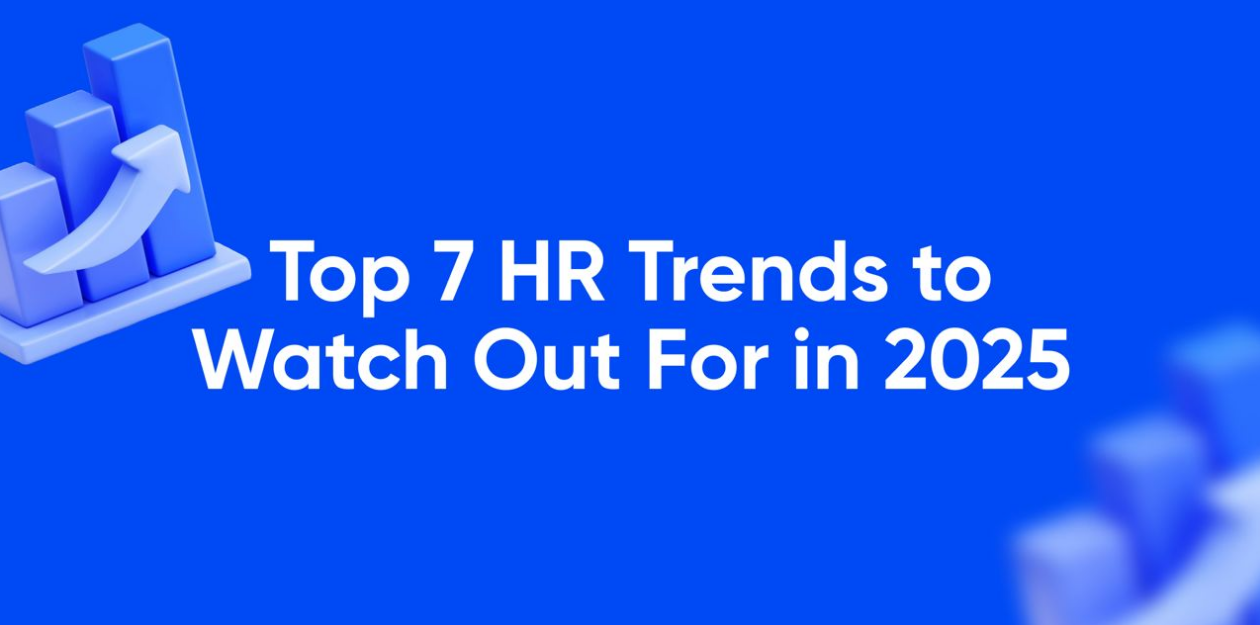As organisations face the evolving dynamics of the workplace, HR departments are increasingly at the forefront of change.
From embracing technology to fostering inclusivity and managing global compliance, HR professionals are redefining how we work.
This guide explores the most critical trends shaping HR in 2025, offering actionable insights for organisations to stay ahead.
This guide combines insights from verified industry reports, public company disclosures, and authoritative research institutions to present an evidence-based view of HR trends shaping Africa’s future workforce.
What HR trend to look out for in 2025
1. The AI Revolution in HR
Artificial intelligence is no longer a futuristic concept; it’s a cornerstone of HR operations. AI tools are revolutionising recruitment, onboarding, and employee engagement by automating tasks, providing predictive insights, and enhancing decision-making.
Applications of AI in HR:
- Recruitment: AI-powered Applicant Tracking Systems (ATS) streamline candidate sourcing, reducing bias and improving diversity. Tools like PaidHiring module evaluate video interviews to assess communication skills and cultural fit.
- Employee Engagement: Chatbots like IBM’s Watson personalise employee experiences, offering real-time support and tailored training recommendations.
- Performance Management: Predictive analytics identify potential high performers and flight risks, enabling proactive interventions.
Takeaway: While AI offers immense potential, HR leaders must address ethical concerns, including bias in algorithms and the transparency of AI decisions.
2. The Acceptance of Hybrid Work
The hybrid work model, blending in-office and remote work, continues to gain traction. By 2025, organisations in Nigeria are expected to increasingly adopt flexible work schedules, driven by employee demand for autonomy, improved productivity, and the rising cost of transportation. The Nigerian National Petroleum Corporation Limited (NNPC) increased the pump price of Premium Motor Spirit (PMS), also known as petrol, by 135.5% from N198/litre to N1,030/litre over 18 months, leading to a significant rise in transportation expenses.
In response, many companies have adopted hybrid and remote work models to alleviate the financial burden on employees and maintain productivity. A survey indicated that managers observed a 62% productivity rate in hybrid work models, further supporting this transition.
Challenges and Solutions:
- Maintaining Culture: Use digital tools like Slack and virtual events to foster connection.
- Equity in Hybrid Work: Ensure that remote employees receive the same career advancement opportunities as on-site staff.
- Wellness Integration: Provide stipends for home office setups and access to mental health resources.
Case Study: Spotify implemented a “Work From Anywhere” policy, allowing employees to choose their work mode. This flexibility led to a 15% increase in employee satisfaction.
Takeaway: To succeed with hybrid work, HR must balance flexibility with accountability, ensuring clear communication and equitable opportunities.
3. Blockchain for HR: Enhancing Trust and Efficiency
Blockchain technology is revolutionising human resources by enhancing trust and efficiency in various processes. Its decentralised and immutable nature ensures secure and transparent management of payroll, employee data, and recruitment.
Traditional payroll systems often involve intermediaries, leading to delays and increased costs. Blockchain enables direct, real-time transactions, reducing processing times and associated fees. This is particularly beneficial for cross-border payments, ensuring employees receive accurate and timely compensation.
Employee Data Management
Maintaining accurate and secure employee records is crucial for HR departments. Blockchain allows for the creation of tamper-proof digital identities, where employees can store and share verified credentials, work history, and other pertinent information. This streamlines the verification process and reduces the risk of fraud.
Recruitment
The hiring process can be time-consuming, with challenges in verifying candidate qualifications and backgrounds. Blockchain facilitates the creation of a decentralized ledger of verified credentials, enabling recruiters to quickly authenticate applicant information. This accelerates the recruitment process and ensures the selection of qualified candidates.
Key Benefits:
- Payroll Transparency: With PaidHR’s wallets and cross-border feature, employees can receive salaries in local currencies or manage cross-border payments easily.
- Credential Verification: Blockchain ensures tamper-proof academic and professional records, reducing fraud.
- Smart Contracts: Automate employee benefits and contract management.
Takeaway: As blockchain adoption grows, HR professionals must collaborate with IT teams to implement secure and scalable solutions.
4. Employee Wellness: A New Priority
Post-pandemic, organizations are prioritizing employee wellness, addressing physical, mental, financial, and emotional well-being. A Deloitte study found that 17% of finance and insurance employees experience burnout, leading to increased absenteeism and decreased productivity. To combat this, companies are implementing mental health support systems, including counselling services and mental health first aid training.
Financial stress significantly impacts employee well-being. Employers have observed that offering financial wellness benefits positively affects employees’ mental, emotional, and social well-being. Providing resources such as financial planning assistance and educational programs can alleviate financial burdens, leading to a more focused and engaged workforce.
Creating a supportive work environment where employees feel valued and understood is crucial for emotional health. Focusing on employee well-being and fostering a positive work culture enhances productivity, reduces turnover, and fuels innovation. Implementing flexible work arrangements, regular check-ins, and promoting work-life balance are effective strategies to support emotional well-being.
Wellness Initiatives for 2025:
- Mental Health Support: Offer anonymous counselling services and promote a culture of openness.
- Financial Literacy: Incorporate in-app tools like PaidHR’s Earned Wage Access, allowing employees to access earned salaries before payday, reducing financial stress.
- Work-Life Balance: Encourage “digital detox” days and flexible leave policies.
Case Study: Unilever’s “Wellbeing Framework” provides employees with access to fitness programs, therapy, and financial advisors, boosting productivity by 12%.
Takeaway: A holistic approach to wellness not only reduces absenteeism but also enhances employee retention.
5. Compliance and Global Regulations: Staying Ahead of Change
As globalization continues to expand, HR departments are increasingly tasked with navigating complex labour laws and compliance requirements across borders. This complexity arises from the need to adhere to diverse regulations in each jurisdiction where a company operates, encompassing labour, employment, data protection, and tax codes.
Non-compliance can lead to significant legal and financial repercussions, including fines, lawsuits, and reputational damage. To mitigate these risks, organizations must implement robust compliance frameworks that include regular audits, staying updated on legal changes, and maintaining accurate records.
Emerging Challenges:
- Data Privacy: Adhere to GDPR and similar laws when handling employee data.
- Remote Work Regulations: Manage tax implications for employees working in different jurisdictions.
- Cross-Border Payroll: Tools like PaidHR’s Cross Border feature simplify currency conversion and ensure compliance with international payment laws.
Takeaway: Invest in legal expertise and HR tech to stay compliant and mitigate risks.
6. Leadership Evolution in HR
In today’s dynamic business environment, HR leaders are increasingly expected to act as strategic partners, driving organizational growth through data-driven decisions and employee-centric strategies. This evolution reflects a shift from traditional administrative roles to positions that influence overall business strategy.
Data-Driven Decision-Making
Modern HR leaders leverage data analytics to inform decisions, enhancing recruitment, performance management, and employee engagement. By analyzing metrics such as turnover rates, employee satisfaction, and productivity, HR can identify trends and implement targeted interventions. For instance, if data reveals high turnover in a specific department, HR can investigate underlying causes and develop strategies to address them.
Employee-Centric Strategies
Adopting a people-centric approach involves prioritizing employee well-being, development, and engagement. HR leaders are implementing programs that support work-life balance, continuous learning, and career advancement. This focus not only enhances employee satisfaction but also contributes to higher retention rates and improved organizational performance.
Integration of Technology
The integration of technology, including AI and machine learning, is transforming HR practices. These technologies enable more efficient recruitment processes, personalized learning and development programs, and predictive analytics for workforce planning. By embracing these tools, HR leaders can make more informed decisions and drive innovation within the organization.
New Leadership Skills:
- Data Literacy: Understand analytics to make informed decisions.
- Change Management: Guide teams through digital transformations.
- Empathy: Foster trust and inclusivity, particularly in hybrid environments.
Takeaway: HR leaders who balance technical acumen with emotional intelligence will thrive in this new era.
7. Future Trends in Employee Benefits
As we approach 2025, organizations are reimagining employee benefits to align with the evolving needs of their workforce. Traditional benefits like health insurance and retirement plans are no longer sufficient. Companies are increasingly offering personalized benefits packages, allowing employees to tailor their perks to fit their unique needs.
Financial wellness is also a growing focus. Employers are providing resources to help employees manage debt and make informed financial decisions, recognizing that financial stress can significantly impact morale and productivity.
Additionally, mental health support is becoming a priority. Organizations are adopting more holistic and personalized approaches to mental health, acknowledging that each employee’s needs are unique.
These trends reflect a broader shift towards benefits that support the overall well-being of employees, recognizing the diverse and changing needs of the modern workforce.
Innovative Benefits:
- Personalised Perks: Offer stipends for wellness, learning, or travel.
- Sustainability Benefits: Subsidise electric vehicles or green home initiatives.
- Work-Life Enhancements: PaidHR’s Christmas Market discounts provide employees with holiday savings, enhancing morale during festive seasons.
Takeaway: Customised benefits signal that organisations care about employees as individuals, boosting loyalty and satisfaction.
Global Perspectives on HR Trends
Human Resource (HR) trends are deeply influenced by regional variations, reflecting the unique cultural, economic, and regulatory landscapes of different areas. Understanding these differences is crucial for organizations aiming to implement effective HR strategies that resonate with local workforces.
Cultural Differences
Cultural norms significantly shape HR practices. For instance, in some cultures, long working hours and dedication are highly valued, while others emphasize work-life balance and personal time. HR policies must accommodate these cultural differences, addressing factors like flexible schedules and remote work options.
Economic Factors
Economic conditions also play a pivotal role in HR trends. In regions with robust economic growth, there may be a greater emphasis on talent acquisition and retention strategies. Conversely, in areas facing economic challenges, organizations might focus on cost-effective HR solutions and workforce optimization.
Regulatory Variations
Regulatory environments differ widely across countries. For example, while the European Union may have directives that aim to harmonize employment laws across member states, each country still retains unique policies regarding issues like annual leave, minimum wage, and termination of employment.
These regional variations necessitate that HR strategies be tailored to align with local norms, economic realities, and legal requirements. Organizations operating in multiple regions must navigate these complexities to ensure compliance and foster a positive work environment.
Examples:
- Europe: Strong focus on sustainability and flexible work regulations.
- Asia: Rapid adoption of AI for recruitment and learning.
- Africa: Emphasis on financial inclusion tools, like PaidHR’s Earned Wage Access, to address economic disparities.
Takeaway: Tailor HR strategies to local contexts while maintaining global alignment.
Industry Performance Data (2023-2024)
The latest insights from McKinsey’s Africa Banking Report 2024 reveal that digital HR transformation is gaining significant momentum across African banking institutions. A remarkable 65% of banks are actively investing in digital HR technologies, streamlining operations and reducing inefficiencies. Automation has become a game-changer, slashing HR administrative tasks by an impressive 45-50%. Additionally, employee engagement has seen a measurable boost, with digital tools driving a 20-25% improvement, highlighting the transformative power of technology in fostering productive and motivated workforces.
Similarly, PwC’s Africa Business Insights 2024 sheds light on broader business trends. Hybrid work models are taking centre stage, with 55% of African businesses adopting these flexible approaches to accommodate modern workforce needs. Investments in HR analytics platforms have surged, with 35-40% of organisations leveraging data-driven insights for better decision-making. Notably, 30% of businesses have integrated AI into their recruitment processes, underscoring the region’s readiness to embrace cutting-edge technology in talent acquisition.
Regional Technology Adoption
Deloitte’s Africa Digital Transformation Report 2024 provides a regional breakdown of digital HR adoption. Southern Africa leads with a 58% adoption rate, followed by East Africa at 52% and West Africa at 45%. These figures highlight the varying levels of technological integration across the continent, influenced by regional priorities and infrastructural capabilities.
Investment in HR technology continues to focus on areas with the greatest impact. Mobile HR solutions, which ensure accessibility and real-time engagement, top the list at 62%. Cloud-based HRIS (Human Resource Information Systems) follow closely at 55%, offering scalability and centralised data management. Meanwhile, 38% of organisations are prioritising AI and machine learning implementations, signifying a growing reliance on advanced technologies to enhance operational efficiency and decision-making.
Implementation Frameworks
The African Development Bank’s Digital Transformation Strategy 2024 outlines a structured approach for organisations embarking on digital HR transformation journeys:
- Assessment Phase
This foundational stage involves evaluating existing infrastructure, conducting digital readiness assessments, and performing cost-benefit analyses to determine the feasibility and potential impact of proposed solutions. - Implementation Phase
A phased rollout approach ensures gradual adaptation while minimising disruptions. Key strategies include implementing robust change management plans and launching skills development programs to equip employees with the necessary competencies for new digital tools. - Monitoring Phase
Continuous tracking of key performance indicators (KPIs) and return on investment (ROI) ensures that the transformation remains aligned with organisational goals. Regular reviews and iterative improvements further enhance the efficiency and sustainability of the digital systems.
Conclusion: Navigating the Future of Work
The HR landscape in Africa is undergoing seismic shifts. By leveraging technology, fostering innovation, and prioritising employee well-being, organisations can navigate 2025 with confidence. Remember, the future of HR isn’t just about adopting trends, it’s about creating strategies that resonate with your workforce and reflect the unique dynamics of the African workplace.
Ready to transform your HR strategy for 2025? Contact us at PaidHR to learn how we can help.






